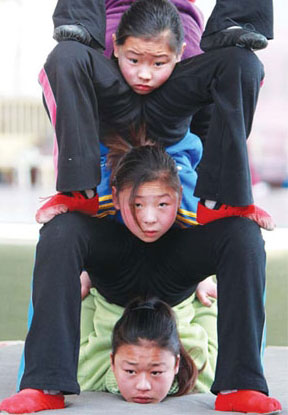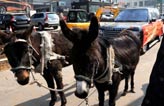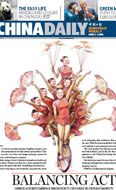Balancing act
Updated: 2011-04-01 10:36
By Lin Jing (China Daily European Weekly)
Most of the troupes have hardly any domestic performances and are mostly reliant on overseas business to make both ends meet.
Higher pay and better working environment are other factors that make up the overseas dream for most of the troupes.
|
 Chinese acrobats embrace innovation to stay ahead in overseas markets. Gao Erqiang / China Daily |
"Besides, acrobats can have the weekends off and also have legal rights as well as labor law protection," he says.
"In China, there are too many acrobatic troupes. The average monthly salary is only around 4,000 yuan if we conduct a commercial show. The highly competitive market has also led to many companies underselling their programs to secure more contract wins."
Shi adds that acrobats rarely get free time off if they are performing in the domestic market.
Liu Feng'en, vice-president of Wuqiao Acrobatic Art School, says that the popularity of Chinese acrobatics in the overseas market could be attributed to its own features.
"Chinese acrobatics has always had its own characteristics," says Liu.
"In terms of skills and techniques, there is no one to surpass Chinese acrobats. The rigorous and strenuous training from childhood has honed the skills of Chinese acrobats."
While Chinese acrobats rely on skills and finesse to showcase their talent, their Western counterparts often depend on fancy and elaborate props. Yet another factor that sets Chinese acrobats apart from the rest of the pack is their ability to perform in huge numbers, often big groups of 20 to 30 performers.
"China is the only country that is good at large-scale performances. This is also the result of the unique management model in China," says Liu.
He says that most Chinese troupes are private enterprises and have more performers available for large-scale performances. Foreign acrobatics troupes often apply patriarch-based management with fewer acrobats.
"Their strengths are humorous acts and comedies, which are often presented as solo shows," he says.
The financial crisis in Europe and the US has also to some extent affected the fortunes of Chinese acrobats.
"Overseas revenue has fallen by 5 to 10 percent very year since 2008," says Xin.
WAT was set up in the 1950s, and currently employs 51 performers. Last year it posted a revenue of 20 million yuan, 70 percent of which came from overseas markets.
Xin says despite the economic crisis, foreign circuses would continue to strike deals with Chinese acrobatics troupes, but at lower costs.
"Originally we would send out 30 performers for a show. But now in order to cut the expenses and salaries, the circuses have asked us to trim the staff to 25, while the salary is the same," he says.
Xin says that despite the blips, the overseas market would continue to be the mainstay for troupes.
"Unlike the Peking Opera, acrobatics is a pure body language without any boundaries. It is something that every body can understand. Challenging the human limits is always an attractive proposition for overseas viewers. Audiences like to see what they cannot do. So it still has a great potential in the world market," he says.
But in an attempt to diversify further, the troupes are now focusing more on program packaging.
"Acrobatic programs are just like garments in the fashion industry. Customers would lose interest if we put on the same show all the time. That is why we have to constantly upgrade our programs according to international market trends," Xin says.
This year, Xin says they would invest 3 to 4 million yuan in program packaging.
"We will use various technologies, including stage design and lighting to present better visual effects, so as to make our programs more exciting and attractive and also to win more contracts," he says.
However, some experts are concerned about the negative influences of excessive packaging.
Yang Shuangyin, head of Cultural Relics Administrative Institute in Wuqiao county, says that program packaging itself is a dilemma. "On the one hand, packaging may make programs much fancier; but it may also reduce the weight of acrobatic skills and techniques in the show."
He emphasizes that the packaging should be moderate, lest the show's intrinsic charm remains hidden.
"Shocking, dangerous, extraordinary and wonderful performances are the four essential elements for acrobatics. Without them, acrobatics would be just like normal dancing."
Li, however, remains upbeat on overseas prospects. He says that will send 36 troupes overseas this year.
"There are some big circuses, like Cirque du Soleil in Canada and Ringling Brothers and Barnum and Bailey Circus in the US who pay great attention to Chinese acrobatics. Every year they arrange one or two world tours and Chinese acrobatics are an integral part of these performances."
Together with the growing market demand, the requirement for better programs is also getting higher year by year.
Li says the requirement of acrobatics has evolved from pure demonstration of physical skill and techniques to better stage presentation skills and more artistic performances.
"Foreign audiences have a higher expectation for Chinese acrobatics programs these days. Traditional programs do not satisfy them any more. Consequently, big circuses have been asking for some tailored programs that are more spectacular, exciting and special," she says.
Li says that for a better development in the world market, besides program packaging, the development of acrobats should not be neglected.
"Though acrobatics takes the lead in all the Chinese art forms in terms of self development, there is still a huge gap compared with the international level. Chinese acrobats should pay more attention to acting and stage presentation skills, and make programs more touching and beautiful."
E-paper

Rise and shine
The Chinese solar energy industry is heating up following recent setbacks in the nuclear sector
Preview of the coming issue
Bombs aim for regime change
CSI, with a twist
Specials

The queen of panda cubs
Spanish Queen Sofia laughs as she plays with a panda.

London's Olympic Stadium
Construction on the flagship stadium for the 2012 London Olympics was completed Tuesday.

Donkey-powered Land Rover
Two donkeys pull a broken-down Land Rover in Shenyang, Liaoning province.
